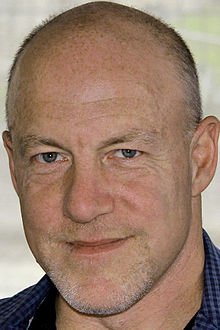Mark Leibovich
| Mark Leibovich | |
|---|---|

Mark Leibovich at the 2013 Texas Book Festival
|
|
| Born |
May 9, 1965 Boston, Massachusetts |
| Occupation | Journalist |
| Nationality | American |
| Education | University of Michigan |
| Genre | non-fiction |
Mark Leibovich (born May 9, 1965) is an American journalist and author. He is the chief national correspondent for The New York Times Magazine, based in Washington, D.C. He is known for his profiles on political and media figures. He also writes the Times magazine's "Your Fellow Americans" column about politics, media, and public life.
Leibovich was previously a national political correspondent in the New York Times' Washington Bureau. He came to the Times in 2006 from the Washington Post, where he spent nine years, first covering the national technology sector for the Post's business section, then serving as the lead political writer for the paper's style section. Leibovich previously worked at The San Jose Mercury News.
He is also the author of This Town: Two Parties and a Funeral-Plus, Plenty of Valet Parking!-in America's Gilded Capital. The book debuted at #1 on the New York Times non-fiction bestseller list in July 2013, and remained on the Times best-seller list for 12 weeks. Leibovich discussed "This Town" on the “The Daily Show” with Jon Stewart, ABC’s “This Week” with George Stephanopoulos,Charlie Rose,PBS’s Moyers and Company and NPR’s “Weekend Edition". He also appeared as a contestant on NPR’s “Wait, Wait Don’t Tell Me”. In a February 2014 edition of Jeopardy!! This Town was the answer to a clue in a category titled “2013 Bestsellers”.
In advance of its July 2013 release, Politico published an article describing This Town as a "chronicle" of the "incestuous ecology of insider Washington." Leibovich, according to the story, is nicknamed "Leibo," and the book's original sub-title was "The Way it Works in Suck Up City."Fareed Zakaria as reviewer for Washington Post praises it as "hottest political book of the summer", containing " juicy anecdotes" and a tell-tale core of "corruption and dysfunction".Richard McGregor of the Financial Times described Leibovich as “like a modern-day Balzac.”
...
Wikipedia
